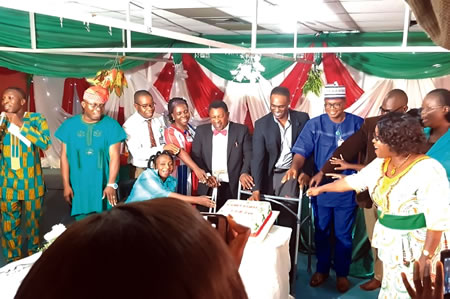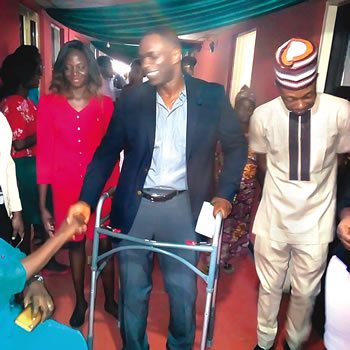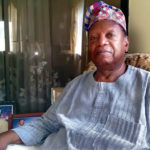THE recollection of the tragedy that befell him in 2008 was gripping. Although the memory lingers in his mind, the sad event of that year has paled into a big testimony for Mr Abiola Amao, Managing Director of Amao Foam. The man recounted his travails in the past years right in front of a crowd of physically challenged children who were spellbound as they listened to the gory story.
Sure ways to maintain your natural hair
Mr Amao, alongside two others, had set out on a journey to Ilesa, Osun State, with excitement in his fairly new jeep. The family expected him to be back from the journey a few hours after but the unexpected happened. He and the others were involved in an accident that nearly cost him his life. He was removed from the wreckage in a critical condition but he lived and is now telling the story of his years of devastation in a cheery mood.
“My trip to Ilesa that year left big trauma in my heart and the hearts of my family members. It totally changed things for me. However, I am happy to be alive to tell the story today. On the fateful day in 2008, I travelled with two other people to Ilesa. There were just three of us in the vehicle. We got to Ilesa safely and then the accident happened. I was the most affected in the crash. I was left in a critical state – between life and death. So much went into efforts to save my life. I went through a surgery that lasted 56 hours. I was in Germany for medical intervention for seven, long, years in an attempt to save my life. The period was filled with lots of troubles and pains for me and my loved ones. But the good thing is that I lived to tell the story today.”
Amao may not have lost his life to the accident but he had the use of his legs taken away in the course of his battle for survival. But despite the challenge, he did not allow the situation to overwhelm him. He rose above the trial to make a mark in the business world as the head of a blue-chip company. Today, he is living the dream of managing a growing concern. During an interview with Saturday Tribune, he declared that “what we need really is love.”
Mrs Joke Alonge also demonstrated that beyond the sky is the limit for anyone with a resolve to rise above huddles in life despite physical limitations. Although life was very difficult for her when she became crippled at the age of14, she weathered the storm and eventually excelled in her chosen career as a social worker. Today, as a successful career officer, she is showing her commitment to the cause of the physically challenged by giving scholarships to girls with lower limbs impairment. Mrs Alonge attributes her success in life to God and the care that she received from Felicia, her late mother.
Recalling her experience as a physically challenged person, Alonge, a social worker in the Social Medical Services Department, UCH, said: “I experienced a whole lot of discrimination in my growing years but I thank God for my mother. She gave me all the support I needed to be confident despite the stigmatisation from my peers, especially in school. Many people looked down on me thinking that all hope was lost. The society looks down on the physically challenged as being less-human or as a never-do-good.
“I have a personal experience of disability; living in Nigeria with such a condition is not easy because there are no support services. The environment is, indeed, very hostile to us and there is no place for us really. We just struggle and pray for God to make us fulfilled. But I am happy that my story has changed. This should be an encouragement to other physically challenged persons. Today, I am an achiever, by the grace of God, and I want to encourage other people, too, not to give up but to keep pressing on. If some of us could overcome stigma and the limitations that the society placed in our way, then everyone else can make it.
“My mother really supported me. I had this disability at the age of 14, but she saw me through secondary school; I went for ‘A level’ and I went for university education. I studied Special Education and won the Ford Foundation scholarship for postgraduate studies in America.”
In order to encourage parents to take full charge of their physically challenged children, Alonge has set up a prize for mothers who give adequate care and support to their physically challenged children noting that their efforts would place the children in positions of advantage.
Explaining the debilitating situation further, she stressed that “The World Health Organisation (WHO), in a research, said 10 percent of the world population has a disability. Going by this statistics, if Nigeria is about 200 million, it then means that about 20 million people have disabilities. That population is significant enough and that can affect so much. If provisions are made for them, they can contribute immensely to the development of the country. Let us bear in mind the fact that 20 million is the population of some other countries. We need to take a critical look at the impact that about 20 million people can make and seek to impact them for positive change”.
However, for this to be achieved, she explained that the physically challenged persons should be free from stigmatisation, they should be given access to education and public buildings should be equipped with facilities that would make such places accessible for them. She also recommended that physically challenged persons be supported in other areas of need as only a little could be achieved in a situation where there are lots of limitations for them.
“We want to urge the government to consider the plight of persons with disabilities. My advice for parents with physically challenged children is that they should be patient with them. They should not allow depression or lack of self-confidence to set in. When the child is depressed or lacks self-confidence, you can’t do anything. There is so much that the government must be doing now. One should not dwell on the past but concentrate on now. Being challenged in one area does not mean that one cannot do what others can do”, she said.
The chairman of the organising committee for the 2018 Physically Challenged Party, who is a Deputy Director in the Department of Physiotherapy, UCH, Mr Oyinlola Odusanya, urged parents to be determined in supporting their children to be the best they can be in life.
He said: “Parents should reach out to the physiotherapy department of UCH for counselling and support. I can tell you that the fact that the children are physically challenged does not mean that they cannot be useful to the society. It only means that they may not be able to perform effectively in certain areas as others. They can attain any height that others without physical challenges can attain and they can even do better in some cases.”
The Head of Department, Physiotherapy, UCH, Mrs Adetutu Akintayo, said the rights of the physically challenged are sacrosanct in any human society, adding: “The Physiotherapy Department, UCH, deemed it necessary to organise a party for the physically challenged children. The time when we do this is the second Wednesday of every December but really, there is no sentiment attached to the date.
“The party for the physically challenged children started in 1967 as ‘polio party’ because at that time, there were many children who had polio. Now that polio is being eradicated, we had to change the name from polio party to party for the physically challenged children. Over the years, the programme has become so popular. We do it because we want these children to feel happy and see themselves as an important segment of the society with hope and potentials. Also, we want them to feel free and happy with us as professionals who attend to them for physiotherapy and not to continue to see us as ‘physio-terrorists’, going by the impression that they have about us. On a normal physiotherapy day, you hear a lot of cries when we attend to the children because of the pains that they go through but we want them to feel free at the programme”.
While delivering the vote of thanks on the occasion, the director appealed to governments at all levels to develop policies that would support the interest of the physically challenged in recognition of their rights to life and welfare packages, saying “only then can we be seen to be fair indeed to all human beings regardless of their challenges or plights.”








